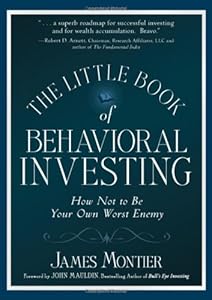Time to prove yourself wrong
How sure are you of your convictions? If I present evidence that refutes your belief, how would you take it? Would you consider my point and argue your case with logic and reason? Or would you stick with your own version because it’s more comforting? Much as we’d like to believe that we fall in the first group, most of us don’t. Again, we’re weighed down by habit. This one is called the “confirmatory bias.”
In Chapter 8 of The Little Book of Behavioral Investing: How not to be your worst enemy, James Montier discusses our tendency to look for evidence that confirms thoughts or insights that agree with us. We practice this to a point where we even bend newfound information to suit our preferences.
Annoying “know-it-alls” (Who isn’t plagued by them?) always have a string of stories and purported facts to push their claims or unasked-for advice. Their art is so convincing that you almost believe they know what they’re about. But contradict them with one fact, try to break their story … and you’ll be facing hours of baseless argument and indignation. Now, the know-it-alls are irksome pests, no doubt, but we’re guilty of the same conduct … at a deeper, self-deceiving level.
When we come to a conclusion on any subject, we unconsciously deviate towards evidence that supports it rather than that which breaks it.
Let’s say you’re looking for houses in a locality you believe is the best fit for your needs. You ask around. Some people say nice things about the area, and you feel happy and contented about your decision. You hear a few moaners too but that’s what they are, right? Moaners. Everyone can’t be happy! But what if you focused on their moaning and researched some more to break your own conviction? I agree, it’s a depressing thought … it’s going to be hard going, unexciting, and it might kill your own plan but consider this: What if you unearth information that saves you from a huge mistake you’d regret all your life?
The internet makes it even harder for us to be open to ideas that are at odds with our personal values. We follow tweets of people whose thoughts align with what we deem right or wrong. The Facebook newsfeed algorithm shows us stories that we “liked” in the past. It’s easy to slip into a self-curated cocoon where we never hear an idea that compels us towards unlikely streams of thought.
Breaking our own analysis – that’s something we never do, at least not willingly and certainly not happily. Many of my friends believe that buying “luxury” flats is a good long-term investment. The idea is so ingrained that it’s like the gospel truth among the IT crowd. Even though research (by a Nobel Prize winning economist no less) proves housing isn’t good investment, I am looked upon as a joker who doesn’t “get it” when I oppose popular view. Almost every flat-owner I know has at least a dozen anecdotes about people who make a “killing” investing in flats. Throw the numbers on a spreadsheet and their enthusiasm quickly fades away. But despite it all, the belief sticks.
That’s our problem. We move away from an opposite point of view. And the more data we access, the more polarized our opinions become. Furthermore, the “biased assimilation” enhances our confidence, all in the wrong direction. It’s a behavioral pitfall that’s annihilated the fortunes of individuals and businesses since ages.
On the other side, there are people like Charles Darwin. He’s the guy who scientifically verified the theory of evolution, explaining our often apelike behavior. His announcement created an uproar in civil society and many opposed his analysis. Did that discourage him? No. Instead, he intensely researched evidence that contradicted his theory, to understand how it fit in.
That’s what an investor needs to do too.
Bruce Berkowitz of Fairholme Capital Management advises investors to look for information that kills a company as opposed to that which supports it. Think of the ways a company can go down – for internal or external reasons, bad strategy, accidents, natural disasters – and verify how well it’s prepared for contingencies. If the company survives the grueling analysis, then maybe it’s worth something.
Many people would call this a “negative” approach. But believe me, it’s that negative attitude that’ll save you in the big bad market. Cultivating this habit will be hard going, especially for the eternal optimists. But did I say becoming a good investor was easy?
Monica Samuel is doing a chapter-wise review of the book: The Little Book of Behavioral Investing: How not to be your worst enemy by James Montier. You can follow the series by following this tag: tlbbinvesting or by subscribing to this rss feed: tlbbifeed

